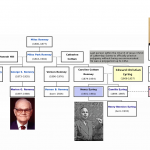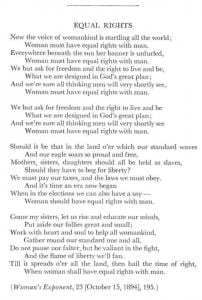As mentioned before, I am offering this blog as a platform for multiple voices speaking on Mormon Fundamentalist issues. Today, we host a guest blogger Penelope Lane.

By Penelope Lane:
I was recently reading an article that laid out why India (even with its large Muslim population) wants to ban polygamy. This is evidently because of the nation’s commitment to gender equality and female dignity. Yet somehow—and it seems absurd—while countries that have experienced polygamy for generations are gradually abolishing its practice (already banned in Pakistan and Bangladesh), in the United States pro-polygamists are pushing for its legalization and finding a sympathetic ear among some of the public.
From a couple of decades of personal experience living in a polygamist community, living polygamy, and from years of reading the research, it’s clear to me that not only do abuses flourish within the haven of polygamy, but also that polygamy itself is abusive—especially to women. At the culmination of the extensive hearings in British Columbia, Canada, to determine whether a ban on polygamy was constitutional, this statement was made by Chief Justice Bauman that, “The harms associated with the practice are endemic; they are inherent.” The harms of polygamy are therefore not the result of random abusive individuals. Social, physical, or emotional harms are inevitable where polygamy exists, even when carried out by well-meaning individuals.
Usually, self-styled, “good polygamists” preface their defense for what they are doing with the mantra, “I’m not like Warren Jeffs.” And many times they are not, but that’s not hard to say when Jeffs is a delusional megalomaniac. However, polygamy is not just about rape of children carried out in the name of religious beliefs. There are many hidden abuses that the public is unlikely to see. I, like many women who became involved in polygamy, was “a consenting adult.” I was over 18, no one held a gun to my head, and I agreed to let my husband bring another woman into his bed. However, unless one has experienced cult life, one will not understand the psychological and emotional pressures to participate.
As a former member of the Church of Jesus Christ of Latter-day Saints I believed implicitly in the teachings of Joseph Smith recorded in Mormon “scripture.” Thanks to the Doctrine and Covenants (Section 132), I sincerely believed that my eternal soul was in danger of destruction if I refused to participate in polygamy. Women from Fundamentalist Mormon, Muslim, and other backgrounds all face cultural pressures to conform to this practice. This is a difficult concept for many to grasp—that women would live polygamy while hating it, simply to please God—but this is a horrible reality. So many of us became adept at stuffing down and denying our emotions, pasting a smile on our face, and dying inside. It was a matter of loyalty—to God, to our leaders, to our husbands, and to our families. “Righteousness” was measured by how outwardly loyal we were to “The Principle.” As a result, I dutifully entered the “Ordinance Building,” placed another woman’s hand in my husband’s, and watched them drive away on so-called honeymoon. The emotional pain was excruciating. I wished for death and contemplated the suicide that I knew I could never carry out, because that would be another reason for God to reject me.
Like a camp survivor, over time I adjusted to what had happened to me. For me and for many women around me, the outcome was endemic depression made worse by the fact that seeking treatment could be interpreted as an admission of guilt, or weakness. It was no wonder that many women would not admit, even to themselves, how painful polygamy was emotionally. Certainly they were not about to admit those feelings to the outside world. Whether the pressure comes from an Imam, Bishop, Pastor, or other religious leader, the coercion is real
Emotional harms are not the sum total of the problem. In polygamy, women are a valuable commodity. With a global 1:1 ratio of males to females, there are just not enough women to go around. This drives down the age of “marriage” as men seek women from outside of their own age group to satisfy their need to live polygamy. This also accounts for the prevalence of underage sexual relations masquerading as “marriage. Because of the shortage of women, polygamist males frequently seek to control the lives of females who are trafficked and traded between families and communities. Another outcome of the shortage is incest. The result is that women carry the brunt of pregnancies where the babies born have serious genetic defects. Fumarase deficiency is a scourge amongst the FLDS and other defects appear in such groups as the Kingstons. Although it is less well-broadcast, other groups are also not immune to first cousin incest.
The constant competition for women takes place while men are also attempting to maintain multiple relationships. This is bad news for women. It forces them to also compete—for love, attention, and resources. Their children are often just a few among many, and rarely is there enough money to go around. Dumpster diving is a reality for many, unless they are propped up by money from reality shows or TV and magazine interviews, or by the money of working children. As Dr. Shoshona Grossbard, professor of economics San Diego University, stated, polygamy is “anathema to women’s economic, social and emotional well-being.”
So when people ask me,” isn’t polygamy just like gay marriage?” I have to say no. Gay marriage is about equal power sharing. With gay marriage, there is no one and no institution pressuring an individual to participate in the first place. Gay marriage is monogamous, which promotes marital and family stability. Most women, without external pressures, want an undivided relationship in which their emotional and financial needs will be met, and one in which their children will benefit from the devoted attention of their partner—all of which are at a premium in polygamy. Polygamy is not part of a liberating sexual revolution. The reality is that most polygamy stems from fundamentalist religious practices be they Mormon, Muslim, or Christian. In every case, the results are overwhelmingly negative for women and for society.
ABOUT PENELOPE LANE:
Born outside of Utah, Penelope is an educated woman with several college degrees. Her family converted to the LDS church when she was a child. However, as an adult she found its doctrinal changes inconsistent with its claims of being led by direct revelation from God.After leaving the LDS church (an emotionally traumatic event), she initially retained her belief in Joseph Smith as a prophet, and saw his life and practices as a template for faithful Mormons. As a result, she was drawn into the black hole of fundamentalist polygamist cults.A couple of decades later, based on what she had experienced and what she had observed, she eventually left polygamy (and all kinds of Mormonism) to make a new life for herself. Since then she has forged a successful career as a professional, free from the practice that she believes causes so much pain and unhappiness for so many.












